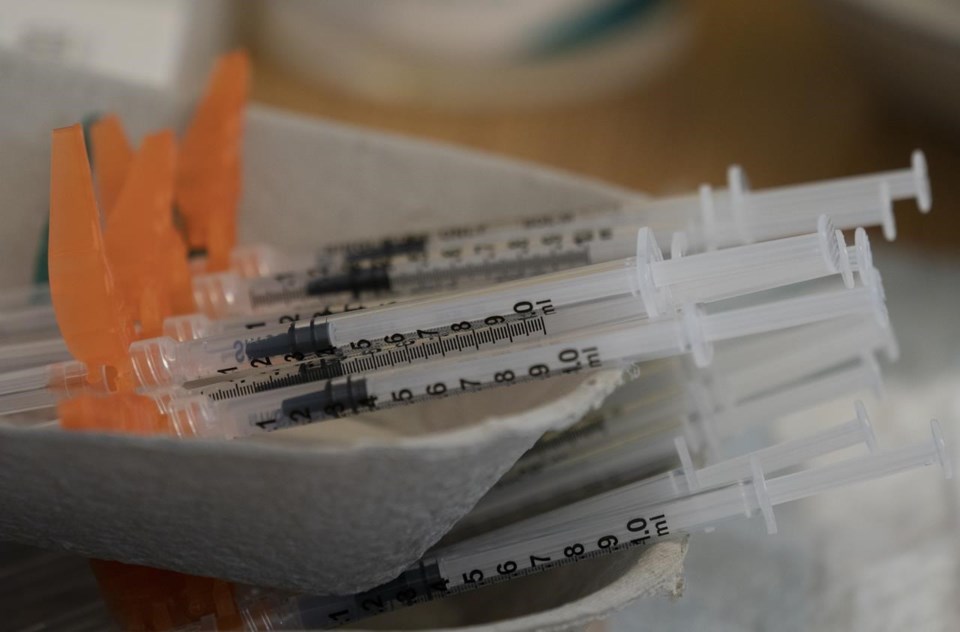VANCOUVER — British Columbia is rescinding its policy requiring provincial public servants to be vaccinated against COVID-19 and is planning a spring booster program that will focus on the elderly and vulnerable.
Provincial health officer Dr. Bonnie Henry said the next round of boosters, expected to begin in April, will target people at the "highest risk" of severe illness.
She said those who should get another shot, six months after their last vaccine or infection, include people aged at least 80, Indigenous people aged at least 70 and long-term care residents.
Adults who are moderately to severely immunity compromised are also recommended to get a booster.
The province also suggests that anyone 60 or older, or Indigenous people 50 or older who have not had COVID-19 consider getting a booster dose.
"For everybody else who's not in that category, our data here in the province … shows that having had a primary series (of vaccines), plus really importantly a booster, continues to provide strong protection," Henry said Friday.
"And having protection against infection goes down quite a bit, but that protection against severe illness and hospitalization remains very high."
Henry said local and international data show that an additional booster for people outside those categories "doesn't add a whole lot of protection."
"Across the age spectrum we have a really high level of immunity that's for many people a combination of immunity they get from vaccination plus having been exposed to and infected with COVID-19," she said.
Henry encouraged anyone who falls outside the categories she described, but who still wants a booster, to discuss the matter with their health-care provider.
Henry said she believes British Columbians will need to have another vaccine dose ahead of the next respiratory illness season which could, over time, turn into an annual booster.
"Or, in my more optimistic days, I hope that with our vaccine technology, we might get a pan-COVID vaccine within the next period of time and maybe we'll only need to have a dose that will last us for longer than five or 10 years even," she said.
The province said from April 3, B.C. Public Service employees will no longer be required to provide proof of vaccination.
Health Minister Adrian Dix said the decision was based on the "very high level of vaccination in the B.C. public service and the current state of the pandemic."
"It reflects what a lot of employers are doing and overall the advice of public health."
In a statement, the Ministry of Finance said more than 98 per cent of employees met the vaccine requirement.
People are still required to be vaccinated if they work in settings under provincial health officer orders or other vaccination requirements, and vaccine mandates remain in place in highest-risk settings like health-care facilities.
Both Dix and Henry said they don't expect the vaccination requirement for health-care workers to change.
The statement said the changes mean "a small number" of employees on administrative leave due to non-compliance will get the chance to come back to work.
"The vaccination requirement for public service employees, introduced in November 2021, was always intended as a temporary measure to help protect employees and the people they serve," it said.
Stephanie Smith, president of the BC General Employees' Union, said it had requested a meeting with the BC Public Service Agency to discuss the rule change and ensure all members received "equitable treatment" under the now-rescinded policy.
“From the beginning of the pandemic, BCGEU members have demanded clarity on how employers’ decisions affect us and our working lives," she said in a statement. "Our union has a number of questions about how this change will impact our members."
Dr. Joshua Greggain, president of Doctors of B.C., said high vaccination rates and low current COVID infection rates make it an "an appropriate time to start relaxing vaccine restrictions."
Greggain said that it's understandable that vaccine mandates remain in place for health-care workers, but staffing shortages across the health-care sector should make the government consider lifting requirements for health-care workers.
"With a serious shortage of health-care staff in our hospitals and emergency rooms and with physicians struggling to provide the care patients need, perhaps it is also time to consider allowing unvaccinated health-care workers to return to the workforce to help ease the staffing crisis, as has been announced for the public sector workforce,” he said.
This report by The Canadian Press was first published March 10, 2023.
The Canadian Press



